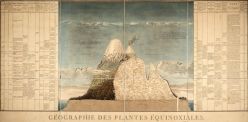Environment(s). Trajectories of a concept
Symposium in Naples, October 24-25, 2024
Call for Abstracts
In the last 60 years, environmental issues have risen to the top of the political agenda. A new collective sensibility has promoted a vision of the environment as a common good, that must be protected and safeguarded proactively, through a radical innovation of the extant system of ethical, political, and social norms. Thus, since the mid-1900s, the environment has become a single concept, endowed with deontic and political significance, conveying the urgency of an integrated approach to face the consequences of human action on physical and biological processes taking place at very different spatial and temporal scales.
Etymologically, “environment” means “surroundings”. In the history of the life sciences, the term has been repeatedly employed to highlight the relevance of the context in the explanation of living phenomena. The cell is the environment for its genes, as a pluricellular organism is for the gut bacteria, the ecosystem for the populations that inhabit it, and the biosphere is the environment for life in its entirety. Can a single concept account for all these different instantiations? The different connotations and individual specificities of the environment aren’t equivalent, neither on the analytical level, as far as the effectiveness and reliability of its modelling are concerned, nor on the operational one, which requires the identification of actionable targets as well as conservation and protection strategies accurately tailored on the respective constitutive dynamics.
The aim of the symposium is to reconstitute the plural history of the notion of environment by means of historically, philosophically, and politically significant case studies that may represent some turning points in the scientific enrichment of this notion (as for instance the biotic characterization of the environment by Darwin enriched the mainly abiotic one by Lamarck, or the integration of sociological aspects has enriched the study of ecosystems, or the incorporation of climate has enriched the notion of global environment), or which may highlight how the discovery of particular environments has helped the advancement of environmental sciences.
The symposium will focus on two sets of issues, which are of particular significance for the current crisis:
- Changes in the representation of the relationship between development, evolution and health of organisms and their environment;
- The role of past environments in modelling the present state of the environment and predicting its future states.
Keynote speakers
Arantza Etxeberria (University of the Basque Country UPV/EHU, Spain)
Daniele Iudicone (Zoological Station Anton Dohrn, Naples, Italy)
The symposium will consist of 3 sessions (24 October full day; 25 October morning). 8 contributions will be selected for the symposium by double-blind review, and additional papers will be selected for the proceedings.
Deadline for Submission: April 15, 2024
Please submit a 750-word abstract (essential bibliographical references excluded) prepared for anonymous review as a Word Document or PDF to: info.environments24@ispf.cnr.it
The abstract file must be accompanied by a separate document containing name and surname of the author(s), affiliation, title of the abstract and e-mail address. The language of the conference is English. Selected speakers will have 30 minutes (including presentation and discussion) for their paper.
For further enquiry, please write to: info.environments24@ispf.cnr.it
Supporting institutions: Institute for the History of Science and Philosophy in Modern Age (ISPF), National Research Council (CNR), Naples, Italy; Res viva. Interuniversity Research Centre for the Epistemology and the History of Life Sciences (www.resviva.it).
Symposium Organizing Committee: Silvia Caianiello (ISPF, CNR – Res viva), Elena Casetta (University of Turin – Res viva), Elena Gagliasso (University La Sapienza, Rome – Res viva), Alessandra Passariello (Zoological Station Anton Dohrn, Naples – Res viva)
Scientific Committee: Carmela Morabito (University Tor Vergata, Rome – Res viva), David Ceccarelli (University Tor Vergata, Rome – Res viva), Maria Conforti (University La Sapienza, Rome – Res viva)
